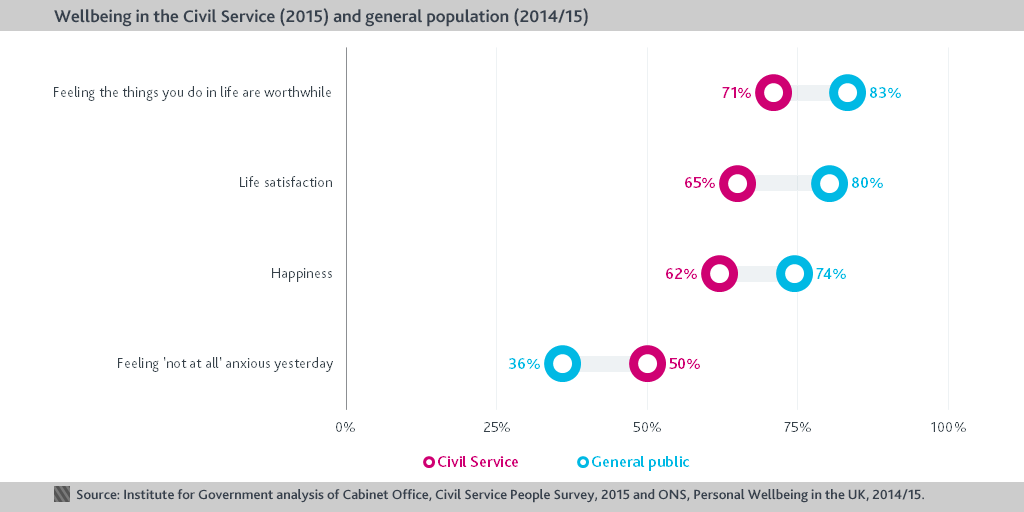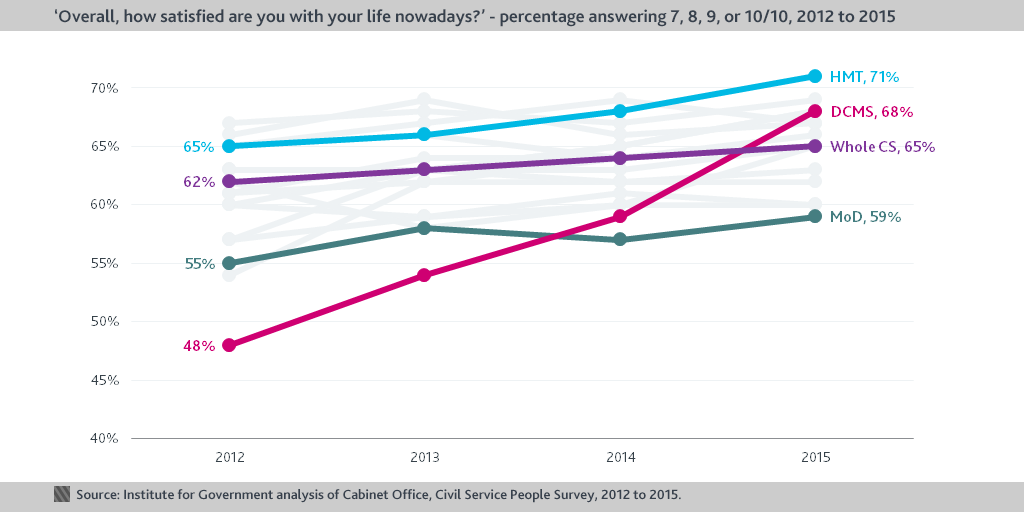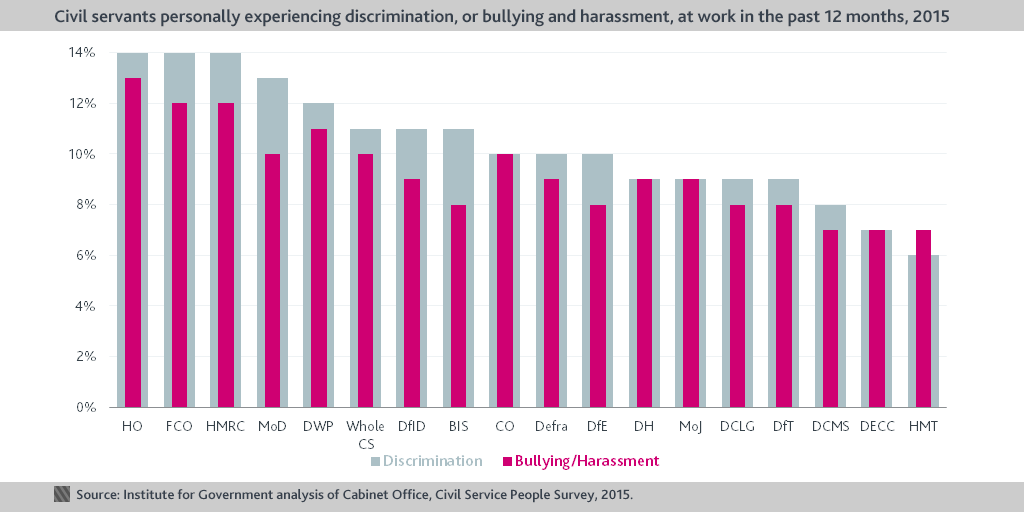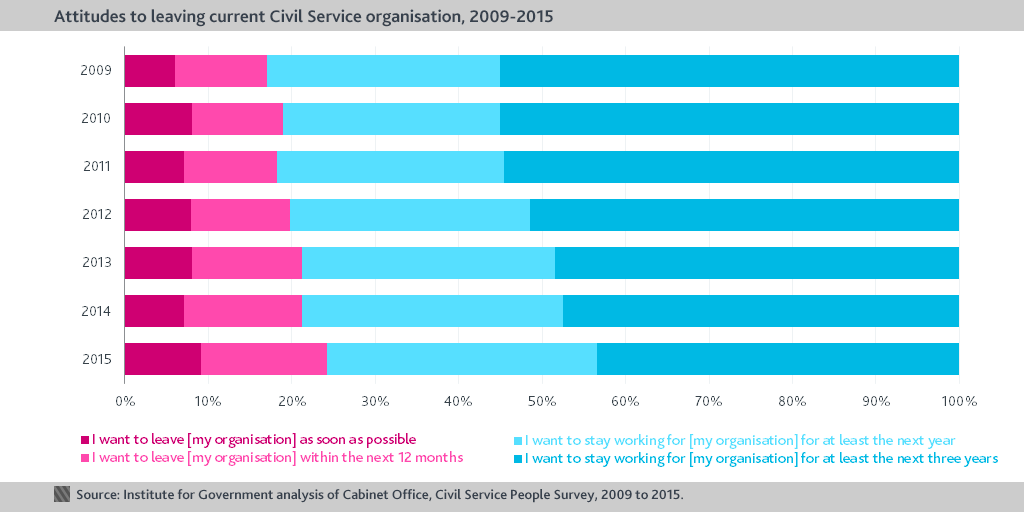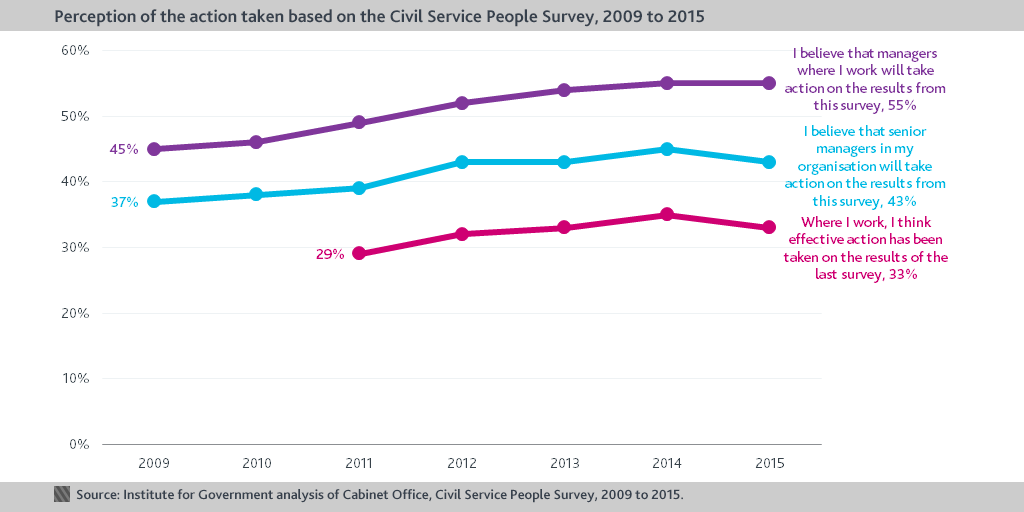The Civil Service People Survey is the largest employee attitude survey in the UK; in 2015 it was completed by over 279,000 civil servants across 96 government organisations. Following our overall analysis of the latest results, and in-depth look at opinions on organisational change and pay, Ollie Hirst examines life satisfaction, bullying and discrimination in Whitehall, as well as the attitudes of civil servants to leaving their organisation.
Civil servants have lower reported happiness and life satisfaction levels than the general population, but are less likely to feel anxious in their work environment.
Around two-thirds (65%) of civil servants rated their life satisfaction as 7–10/10, but this is significantly lower than the 80% of the general public who said the same. Similarly, 71% of the Civil Service gave a score of 7 or higher (out of ten) in answer to the question ‘Overall, to what extent do you feel the things you do in your life are worthwhile?’ compared to 83% of the general population. Reported happiness was also 12 percentage points lower in Whitehall than in the UK as a whole.
However, half of civil servants claimed to be ‘not at all anxious’ on the day before the survey was conducted (giving a score of 0–3/10), compared to only 36% of the general public.
The Treasury is the department with the highest life satisfaction; DCMS has seen the greatest increase since 2012.
Life satisfaction in the Civil Service has increased in the past three years: 65% of staff rate their life satisfaction as 7–10/10, compared to 62% in 2012.
The highest-scoring department is the Treasury, where 71% of civil servants express high levels of life satisfaction. MoD – where only 59% of civil servants rate their satisfaction as 7/10 or higher – has remained the department with the lowest score, despite a modest increase since 2012. DCMS is the department which has experienced the most dramatic increase in life satisfaction in the past three years, reaching 68% in 2015 following a 20 percentage point rise since 2012.
The Home Office has the highest percentage of civil servants who feel that they have personally experienced bullying and harassment or discrimination at work in the past year.
Around one in seven civil servants in HO, FCO and HMRC claim to have personally experienced discrimination at work in the past 12 months, while around one in eight in these departments say they have experienced bullying or harassment. The Treasury and DECC are the departments with the lowest reported incidence of bullying or discrimination, although this figure is still around 7%.
Eradicating discrimination in Whitehall has been identified as a top priority by Cabinet Secretary and Head of the Civil Service Sir Jeremy Heywood following these results. While the refreshed Talent Action Plan includes measures to tackle bullying and harassment, this data shows the extent of the problem and demonstrates that there is still progress to be made in tackling discrimination in the Civil Service.
Almost a quarter of civil servants want to leave their organisation within a year.
24% of Civil Service staff want to leave their organisation within a year – an increase from 17% in 2009. 9% say they want to do this as soon as possible, and 15% say at some point within the next 12 months. The most significant change has been in the proportion of civil servants who want to stay working for their organisation for at least the next three years; while 55% said this in 2009, only 43% do in 2015. It is noteworthy that the proportion of civil servants who want to leave their organisation has continued to rise, despite the recovery of some engagement measures since 2014.
Belief in the value and impact of the People Survey has increased since 2009, but has now plateaued.
Only a third (33%) of civil servants think that effective action has been taken on the results of the last survey in their department, although this figure has increased since 2011. However, between 2014 and 2015 this percentage decreased for the first time since the statement was first included in the survey.
Although 55% of Whitehall staff believe that managers where they work will take action on the results of this year’s People Survey (up from 45% in 2009), civil servants are more sceptical about the willingness of more senior figures to do the same, with only 43% believing that senior managers will take action on the survey. Such figures highlight the need to go beyond the simple collection of engagement data, to using findings in the implementation of targeted, visible improvements.
Find out more about the Civil Service People Survey.
Read the IfG's overall analysis of the latest Civil Service People Survey results.
See our in-depth look at opinions on organisational change and pay.
- Topic
- Civil service
